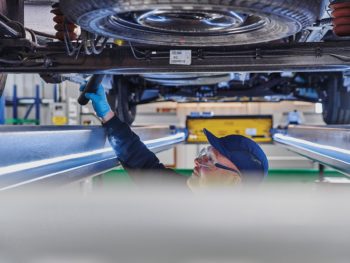Last-mile delivery fleets could cut both costs and valuable downtime by taking a proactive stance on van maintenance, according to ATS Euromaster.

It says that due to continued high demand for home deliveries, fleets are placing vehicles under critical stress as assets are virtually in constant use.
And this means that identifying potential maintenance items in advance is becoming an increasingly critical area for efficient and cost-effective fleet management.
The tyre service and maintenance provider reveals many fleets are turning to ‘double-shifting’, using one van for two driver shifts to meet the increasing demand for home delivery, accelerated by the Covid pandemic and the increase in consumer convenience demands. Such a practice extends the operating hours of the fleet and business, while meeting the Working Time Directive for drivers.
Mark Holland, operations director at ATS Euromaster, commented: “In practice, it means that vehicle downtime is more of an issue for last-mile delivery fleets than the actual cost of maintenance.”
But ATS data also reveals that proactive vehicle maintenance can assist fleets to first-time MOT passes and reduce costly vehicle off road time. According to Government data, up to 29% of light commercial vehicles fail their MOT on brake defects.
“With fleets having to run vans more intensely on longer life cycles thanks to the lack of vehicle availability, taking a more holistic approach to SMR maintenance means downtime can be reduced, and overall costs managed more efficiently,” added Holland.
By servicing vehicles at an ATS centre – whether for a tyre change or scheduled SMR work – fleets are provided with a Digital Vehicle Health Check (DVHC). This not only shows completed work but also includes any defects, recommendations and advisories.
Holland continued: “This means we can identify future spend now. It enables fleets to plan and budget for preventative maintenance and they can budget for this.
“For example, a customer may visit us with a brake issue thinking a change of pads is required. But we identify warped discs, which will also mean a change of brake fluid. We refer the vehicle for rectification of all three items. If the full brake change cannot be completed that day, we re-book the vehicle for a time when all three items can be replaced at once.
“Helping customers proactively identify issues means we can save customers critical vehicle downtime. When uptime is so essential, this is a significant saving for the fleet operator.”

